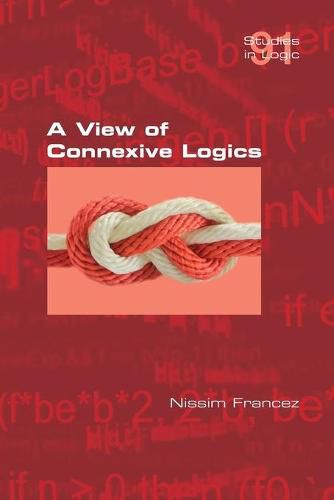Readings Newsletter
Become a Readings Member to make your shopping experience even easier.
Sign in or sign up for free!
You’re not far away from qualifying for FREE standard shipping within Australia
You’ve qualified for FREE standard shipping within Australia
The cart is loading…






This title is printed to order. This book may have been self-published. If so, we cannot guarantee the quality of the content. In the main most books will have gone through the editing process however some may not. We therefore suggest that you be aware of this before ordering this book. If in doubt check either the author or publisher’s details as we are unable to accept any returns unless they are faulty. Please contact us if you have any questions.
This book is the first ever monograph on the topic of Connexive logics, a family of non-classical logics, based on the intuition that a proposition cannot validly imply, nor be implied, by its own negation.
Similar to Relevance logics, Connexive logics require a meaning connection between the antecedent and the consequent of a valid implication. The interaction between negation and conditionals, as well as with other connectives, is closer to certain uses of them in natural languages.
The book is not a fully comprehensive study of Connexive logics; rather, it presents the author’s own view of those logics, with emphasis on the facets of those logics that interest the author. Still, it contains enough material to familiarize the reader with those logics, understand how they originate and how they are motivated, and the proof-theoretic and model-theoretic principles underlying them.
It is hoped that this book will contribute to the popularization of Connexive logics and to the growth of the, currently small, community interested in them.
Nissim Francez is an emeritus professor of computer science at the Technion, Israel Institute
of Technology. At a certain point in his career he moved from research related to concurrent and
distributed programming and program verification to research in computational linguistics, mainly formal semantics of natural language. In recent years, he has worked on Proof-Theoretic Semantics, in particular for natural language. More recently, he has worked also on non-classical logics, including Connexive logics.
$9.00 standard shipping within Australia
FREE standard shipping within Australia for orders over $100.00
Express & International shipping calculated at checkout
This title is printed to order. This book may have been self-published. If so, we cannot guarantee the quality of the content. In the main most books will have gone through the editing process however some may not. We therefore suggest that you be aware of this before ordering this book. If in doubt check either the author or publisher’s details as we are unable to accept any returns unless they are faulty. Please contact us if you have any questions.
This book is the first ever monograph on the topic of Connexive logics, a family of non-classical logics, based on the intuition that a proposition cannot validly imply, nor be implied, by its own negation.
Similar to Relevance logics, Connexive logics require a meaning connection between the antecedent and the consequent of a valid implication. The interaction between negation and conditionals, as well as with other connectives, is closer to certain uses of them in natural languages.
The book is not a fully comprehensive study of Connexive logics; rather, it presents the author’s own view of those logics, with emphasis on the facets of those logics that interest the author. Still, it contains enough material to familiarize the reader with those logics, understand how they originate and how they are motivated, and the proof-theoretic and model-theoretic principles underlying them.
It is hoped that this book will contribute to the popularization of Connexive logics and to the growth of the, currently small, community interested in them.
Nissim Francez is an emeritus professor of computer science at the Technion, Israel Institute
of Technology. At a certain point in his career he moved from research related to concurrent and
distributed programming and program verification to research in computational linguistics, mainly formal semantics of natural language. In recent years, he has worked on Proof-Theoretic Semantics, in particular for natural language. More recently, he has worked also on non-classical logics, including Connexive logics.